Table of Contents
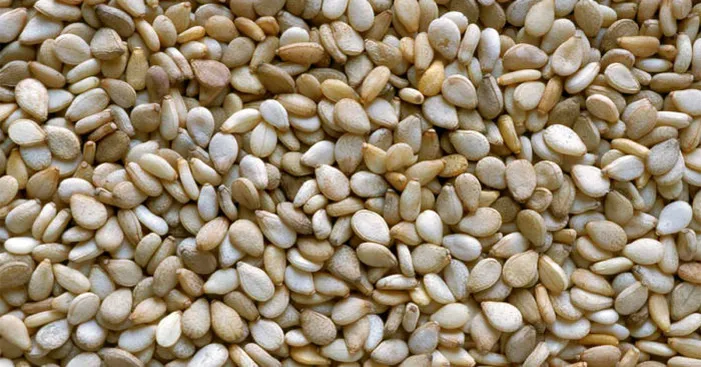
Sesame seeds, a staple ingredient in Asian cuisine and across the Middle East, adding a nutty depth to dishes like Tang Yuan and black sesame soup (1), have become a rising star in American kitchens.
Their unique flavor, especially when roasted, evokes hazelnuts and complements an array of dishes, including the beloved American classic, chicken with sesame seeds (2).
In recent years, this super seed found its way to the American cuisine as we can find it in many dishes including the famous chicken with sesame dish.
Not only the seeds are abundantly consumed all across the world, sesame oil is also very popular.
In Europe, sesame seeds are mainly used in baking and pastry.
Sesame seeds benefits:
Nutritional values:
However, sesame is a highly nutritive seed as it is rich in antioxidants, essential fatty acids, fiber, protein, and many minerals such as Calcium, Iron, and Phosphorus.
These seeds are part of the oleaginous plant family, which consist of the seeds that are rich in essential fatty acids and are not synthesized by our bodies. (3)
This nutritional information count for the daily recommended doses suggested by the USDA, which is three tbsp of raw sesame seeds: (4)
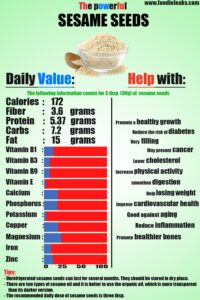
- Calories: 172
- Protein: 5.37 g
- Carbs: 7.2 g
- Fat: 15g
- Fiber: 3.6 g
- B1 vitamin: 14.8%
- B3 vitamin: 9.3%
- B9 vitamin: 9%
- E vitamin: 2.75%
- Calcium: 22%
- Phosphorus: 21.14%
- Potassium: 3.38%
- Copper: 22.2%
- Magnesium: 27.3%
- Iron: 11.2%
- Zinc: 14.16%
Health benefits:
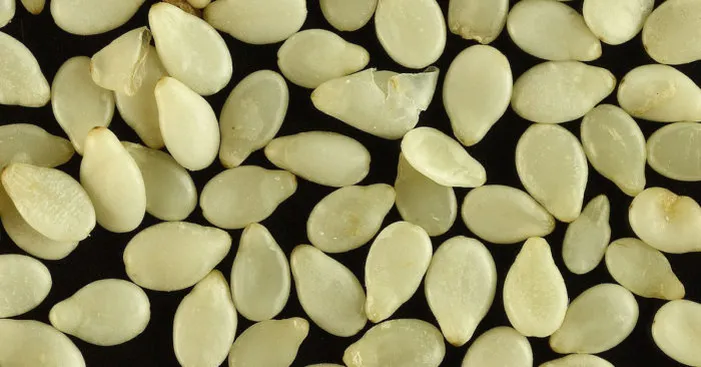
Sesame seeds are full of nutrients that are beneficial to human health including:
Protein:
Protein makes about 25% of sesame composition, and this percentage can even go higher depending on the type of the sesame seeds. (5)
As you may have learned before, protein exists in each and every cell of our bodies.
It plays a key role in the regeneration process of making new cells and interferes as a line of defense facing bacteria and viruses.
In addition, it is essential in the transportation of molecules throughout the body, which results in healthier growth especially for children, pregnant women, and adolescents. (6)
Fibers:
As for the fiber content, just 3 tbsp of sesame seeds (30g) contain 3.5 grams of dietary fiber and that makes about 12% of the daily needs in fiber.
As mentioned in previous articles, the dietary fiber goes through our bodies undigested.
Once they reach the stomach, fibers start contributing to the digestion process as well as the intestinal transit. (7)
Fibers also reduce the risk of obesity, certain types of diabetes, many types of cancer, and heart diseases.
Fatty acids:
Sesame seeds contain about 45% linoleic acid and 40% of oleic acid. (8)
Oleic acid is an omega-9 mono-saturated fatty acid that is proven to lower bad cholesterol and promote heart health.
On the other hand, linoleic acid (LA) is very important in the process of synthesizing different hormones essential for most physical activities. (9)
Calcium:
When we think of calcium, usually we link it to milk and certain types of herbs.
Did you know that certain seeds contain more calcium than milk itself!
In fact, 3 tbsp of sesame seeds provide 22% of the daily needs in Calcium and that is the same amount of calcium found in a cup of milk. (10)
Despite the long list of vitamins and minerals found in sesame, it also contains phytates and oxalates.
These two antioxidant compounds can reduce the absorption of some minerals including calcium and in severe cases can lead to kidney stones. (11)
Nonetheless, this problem can easily be tackled by soaking the seeds or roasting them, then you’ll benefit from the calcium found in sesame seeds without any risk to your health.
Health benefits:
May prevent cancer:

Sesame seeds contain high amounts of phytosterols, chemical compounds found in plants that reduce the absorption of bad cholesterol from food.
It also reduces free radicals, therefore, reduces the risk of developing cancer.
In 2005, a study published by the Journal of Agricultural and Food Chemistry shows that sesame seeds are the richest seeds in phytosterols. (12)
Besides, they are high in lignans, a component found mainly in plants, and have the ability to mimic the effect of a female sex hormone.
These components belong to the phytoestrogens family, whose consumption has been linked to a lower risk of certain cancers, especially in the post-menopause period.
Among the types of cancer that may be prevented by the consumption of sesame we mention: (13)
- Leukemia.
- Lung cancer.
- Breast cancer.
- Colon cancer.
- Prostate cancer.
- Pancreatic cancer.
Help losing weight:

Several studies indicate that sesame seeds contain certain components that can help to maintain a waist and increase fat burning. (14)
In 2012, Maryland University conducted an animal study and found that feeding rats a powder full of sesame helped these animals reduce weight.
Also, as mentioned above sesame seeds are a good source of dietary fibers that slows stomach emptying, and this results in a longer feeling of fullness.
Furthermore, it regulates blood sugar levels and prevents any disruptions that usually lead to feelings of hunger.
A good asset against aging:

Thanks to its richness in vitamin E and its antioxidant properties, sesame seeds are very beneficial against aging. (15)
Consuming them regularly would ensure a good state of the blood vessels which means healthier internal organs.
These seeds can also provide your body with the energy supply it needs to be able to carry on physical activities.
It would also improve endurance and resistance which is why sesame seeds were introduced as a remedy for athletes in the 1968 Olympic Games. (16)
In fact, some athletes (marathon and long-distance runners) increased their performance by eating sesame regularly.
Fighting against aging is a lifelong fight, and thus one should be prepared for a long fight by fueling the body with natural energy food such as sesame seeds, as this will help to increase physical activity and therefore maintain a healthier body.
Reduce inflammation:

Some benefits of sesame seeds are because of the large copper content in them.
This mineral reduces inflammation of the bones, joints, and muscles which can be very relieving for people who deal with arthritis pain. (17)
In addition, copper plays a key role in the strengthening of the blood vessels, joints, and bones.
It is also essential for the proper assimilation of iron, which is an essential component for hemoglobin production.
Providing your body with its daily needs in Copper will increase blood circulation and that will ensure the proper oxygenation of all the body organs.
Ensure healthier bones:

A recent study was published in 2019 by the Journal of Medical Science Monitor, which was conducted on a group of lab rats, showed that consuming sesamin (found in sesame) helped improve the bone structure and reduced the risks of osteoporosis. (18)
Also, another study made in 2012 showed that consuming sesamin plays a role in bone cell development. (19)
The recommended daily dose of three tbsp of sesame seeds will provide your body with 14% of its daily need in Zinc, an essential mineral that helps to increase bone density.
Smoothen digestion:

Sesame seeds are very beneficial for our digestive system.
This is because they offer a large amount of dietary fibers which plays important roles in: (20)
- Reducing the chances of diarrhea and constipation.
- Protecting the intestines from bacterial infections.
- Facilitating the intestinal transition of feces.
- Reducing the risk of developing cancer.
More about sesame seeds:
Different types of sesame seeds:
There are a wide variety of sesame seeds and the common way to distinguish them is through color.
The most famous ones are:
White sesame:
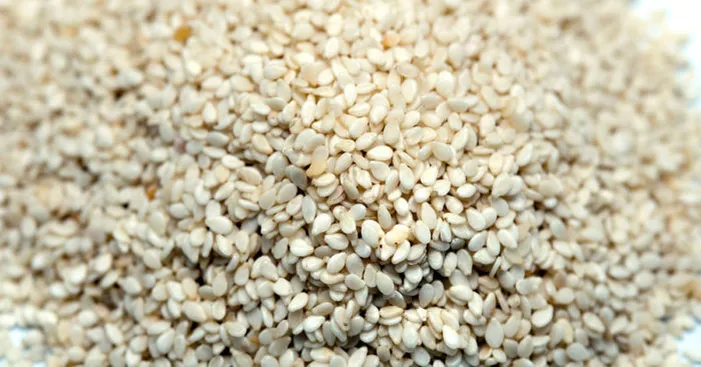
These are sesame seeds that are hulled by removing their external coating to expose the white internal seed.
It is mostly used in bakery and pastry.
As it has a taste that resembles that of hazelnuts, it is perfect to flavor rolls and cakes.
Some African countries use white sesame to make other dishes including the famous Egyptian Tahini. (21)
Black sesame:
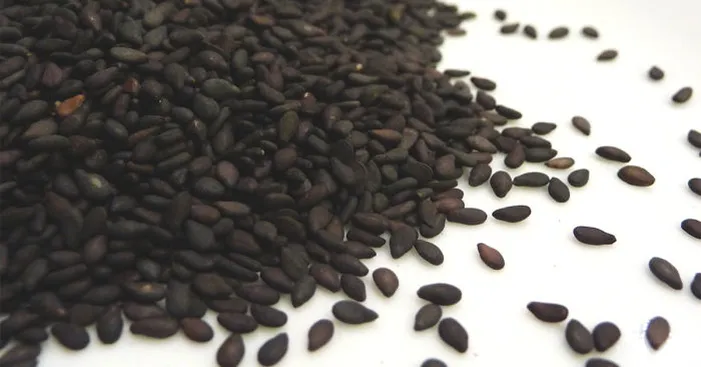
This variety tastes stronger than other sesame seed varieties.
That makes it perfect for marinating vegetables and meat and seasoning salads.
In addition, it can be used as breadcrumbs to add crispness to your fried seafood such as shrimp, tuna, and tilapia.
Brown sesame:
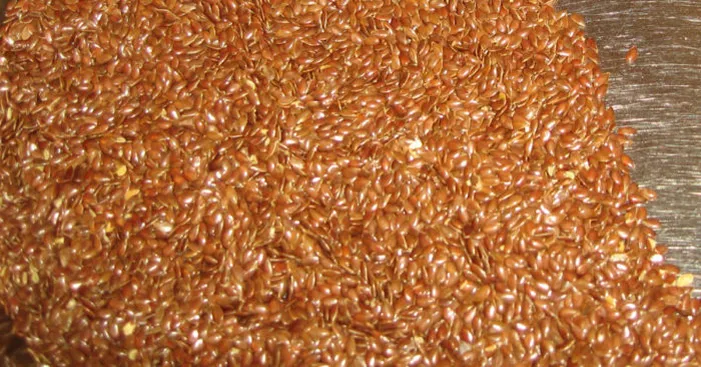
This type of sesame seed is the richest one in oil content as it contains more than 40% of oil.
Because of this, it is the most common sesame variety used to extract sesame oil.
It can also be added to cookies or bread or blended and added to a Tahini dish.
Uses of sesame seeds:
Sesame is used in many different forms such as seeds, oil, or sesame paste.
The seeds can be eaten raw, roasted, or dried and as mentioned above they can also be used in bakery or pastry as well as salad seasoning.
Also, sesame oil offers a lot of health virtues and has the same antioxidant properties as the seeds.
The oil can be used both internally and externally by massaging it into the skin.
It protects the skin from irritations and allows it to maintain its smoothness.
Precautions for the use of sesame:
There are two types of sesame oil and it is better to use organic oil, which is more transparent than its darker version. (22)
However, the consumption of sesame oil, whether it is the light organic version or the dark version, is not recommended for pregnant or breastfeeding women or young children.
It is necessary to mention that some people are allergic to sesame seeds and oil.
These people experience unhealthy reactions such as breathing difficulties, digestive issues, and skin rashes.
Finally, an excessive consumption of sesame can lead to diarrhea or even a slight increase in weight.
References:
(1): https://thewoksoflife.com/tang-yuan-recipe/
(2): Sesame (purdue.edu)
(3): https://ihealthlabs.eu/en/blog/oleaginous-fruits-and-their-health-benefits-n14
(4): https://fdc.nal.usda.gov/fdc-app.html#/food-details/1100608/nutrients
(5): Protein and oil composition of sesame seeds (Sesamum indicum, L.) grown in the Gizan area of Saudi Arabia: International Journal of Food Sciences and Nutrition: Vol 49, No 6 (tandfonline.com)
(6): 9 Important Functions of Protein in Your Body (healthline.com)
(7): Why Is Fiber Important in Digestive Health? | Everyday Health
(8): Agronomy | Free Full-Text | Fatty Acid Composition of Sesame (Sesamum indicum L.) Seeds in Relation to Yield and Soil Chemical Properties on Continuously Monocropped Upland Fields Converted from Paddy Fields | HTML (mdpi.com)
(9): Linoleic Acid – PMC (nih.gov)
(10): 4 Foods That Have More Calcium Than Milk (foodunfolded.com)
(11): Are anti-nutrients harmful? | The Nutrition Source | Harvard T.H. Chan School of Public Health
(12): https://pubmed.ncbi.nlm.nih.gov/16302759/
(13): Sesame Seeds: Your Defence Against Cancer | by HLAgro | Medium
(14): Weight Loss: Reasons Why Sesame Seeds (Til) May Help Lose Weight And Burn Belly Fat (ndtv.com)
(15): Antioxidant Properties In Sesame Seeds Can Act As A Boon For Your Skin And Health | Food (ndtv.com)
(16): https://www.doping.nl/media/kb/6495/Yesalis%20et%20al%202002.pdf
(17): 6 Copper Health Benefits + Sources, Intake & Dangers – SelfDecode Labs
(18): https://pubmed.ncbi.nlm.nih.gov/31314750/
(19): https://bmccomplementmedtherapies.biomedcentral.com/articles/10.1186/1472-6882-12-71
(20): Fiber: How It Aids Digestion (webmd.com)
(21): https://minimalistbaker.com/how-to-make-tahini/
(22): Differences in Dark and Pure Sesame Oil | livestrong
